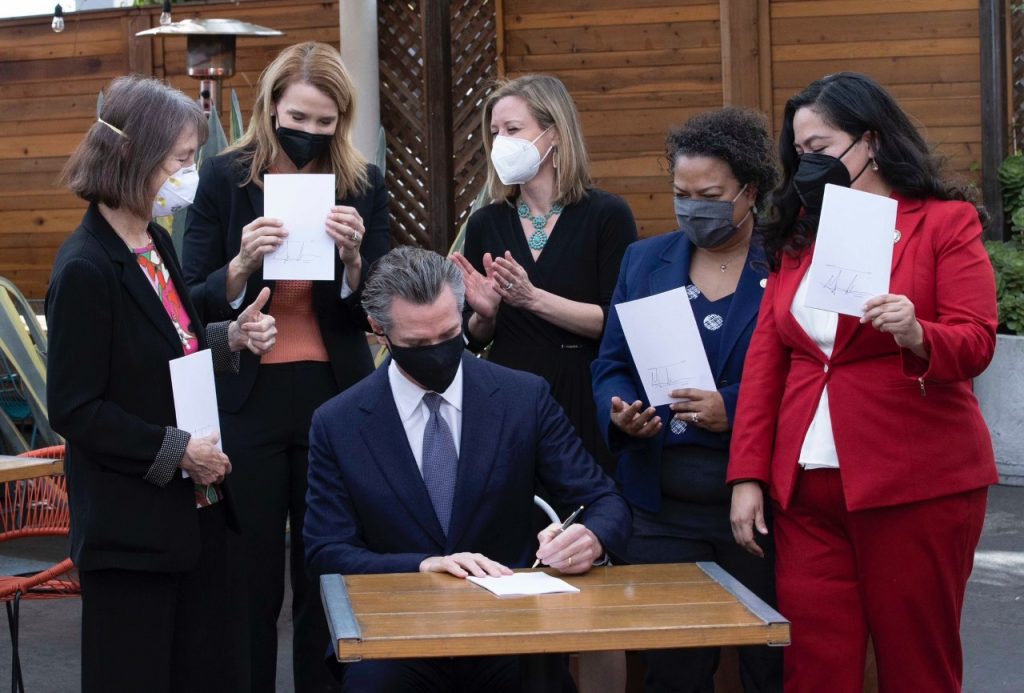SB 114 ensures employees have access to COVID-19 supplemental paid sick leave through September 30, 2022
SB 113 provides $6.1 billion in tax credits, grants and other relief for small businesses, including nearly $500 million in tax cuts for restaurants and shuttered venues and $5.5 billion in restored tax deductions and tax credits to spur innovation
OAKLAND – Governor Gavin Newsom today visited a small business in Oakland to sign legislation extending COVID-19 supplemental paid sick leave for workers, and early budget action to provide an additional $6.1 billion in tax relief, tax credits and direct grants for small businesses hit hard by the pandemic, bolstering the state’s historic COVID relief efforts and investing in California’s iconic entrepreneurial economy.
“As California continues to lead the nation’s economic recovery, today’s action deepens our commitment to supporting the workers and businesses that have sustained us all during this unprecedented pandemic and are driving our economy,” said Governor Newsom. “We’re ensuring that workers have the time they need to take care of themselves and their loved ones, expanding our nation-leading small business relief grant program and supporting the businesses whose innovation and entrepreneurial spirit help make California the 5th largest economy in the world.”

Governor Newsom signs paid sick leave extension and COVID relief for small businesses while visiting NIDO’s BackYard in Oakland.
Outlined by the Governor, Senate President pro Tempore Toni G. Atkins and Assembly Speaker Anthony Rendon in January, SB 114 by the Committee on Budget and Fiscal Review ensures that employees continue to have access to up to 80 hours of COVID-19 supplemental paid sick leave through September 30, 2022, which may be used by employees who have been advised to quarantine, those caring for COVID-impacted family members, attending a COVID-19 vaccination appointment, and more. Small businesses employing 25 or fewer workers are exempt from the legislation, which is retroactive to sick leave taken beginning January 1, 2022.
“Paid sick leave is key to ensuring workers don’t have to make the impossible choice between going to work sick or losing wages needed to pay rent and keep food on the table,” said Art Pulaski, Executive Secretary-Treasurer of the California Labor Federation. “By signing COVID paid sick leave into law today, Gov. Newsom provided critical protection to frontline workers and families across the state, and underscored California’s commitment to the essential workers that have given so much to help our communities weather this devastating pandemic.”
Building on last year’s robust support for small businesses impacted by the pandemic — including $6.2 billion in tax relief for small businesses that received Paycheck Protection Program loans — Governor Newsom today signed SB 113 by the Committee on Budget and Fiscal Review to provide an additional $6.1 billion in tax relief, tax credits and direct grants to the hardest hit businesses. SB 113 includes provisions that:
- Provide a nearly $500 million tax cut for restaurants and venues: By conforming state tax policy for the federal Restaurant Revitalization Fund and federal Shuttered Venue Operators grant programs, grants received by such businesses will not be considered taxable by the state – translating into a tax cut totaling nearly $500 million over the coming years.
- Restore $5.5 billion in tax credits and deductions for California businesses: By restoring business tax credits, including for research and development and the net operating loss deduction for businesses one year early, the near-term benefit for such businesses is estimated to reach $5.5 billion.
- Invest $150 million in COVID-19 relief grants for California’s small businesses: SB 113 invests an additional $150 million in California’s Small Business COVID-19 Relief Grant Program to fund applicants on the waitlist – the program has provided grants of up to $25,000 for small businesses impacted by the pandemic.
“This business relief package of more than $6 billion will help to offset losses employers have incurred, help create good paying jobs, and will speed up our economic recovery from the pandemic,” said Jennifer Barrera, CEO of the California Chamber of Commerce. “While we have more work to do, this sends the right message that California is investing in the success of our business community.”
“Paid sick leave is a life or death issue for grocery workers like me and the customers in our stores,” said Samantha Webster, a grocery store worker at Safeway in Hercules and a member of the United Food and Commercial Workers Local 5. “I’m proud of the way grocery workers came together to demand this important public health measure. Having access to supplemental paid sick leave will now let me stay home if I need to and not have to worry about getting my customers and coworkers sick.”
From the beginning of the pandemic, the Administration has taken action to protect and support California’s workforce, including expanding access to job-protected Paid Family Leave and workers’ compensation; more resources for critical child support services for essential employees and vulnerable populations; additional weekly unemployment benefits; building a pipeline of personal protective equipment to help workers stay safe on the job; and support for employees to isolate and quarantine outside their home, among other measures.
“I’m grateful to the Governor and our leaders in the Legislature for taking this urgent action to support teachers like me with the paid sick leave we need to keep ourselves, our families and colleagues safe while providing a safe learning environment for students,” said Johanna Garcia Normart, a teacher at Eden Gardens Elementary in Hayward. “This extension will help our schools continue to meet the unprecedented pandemic challenges we face every day.”
“Paid COVID sick leave really matters for all workers, and especially for health care workers, who need it in order to provide quality safe services to our patients and communities, and in order to take care of ourselves and families, too,” said Mayra Castaneda, a health care technologist and member of SEIU UHW.
For full text of the bills, visit: http://leginfo.legislature.ca.gov.
###
